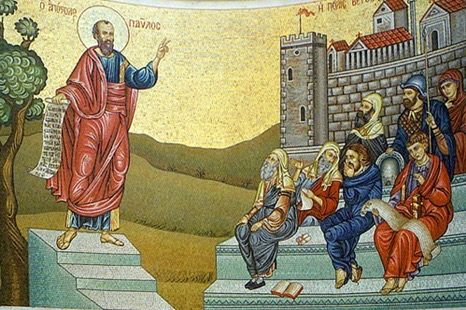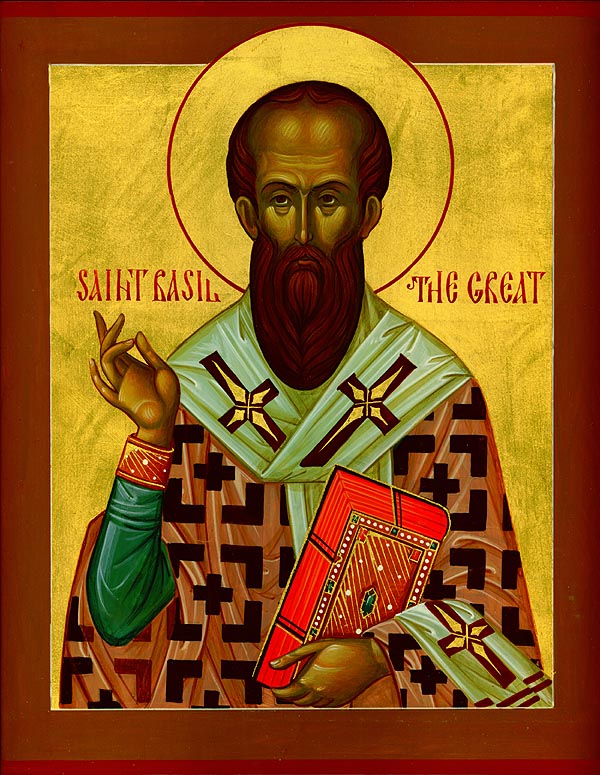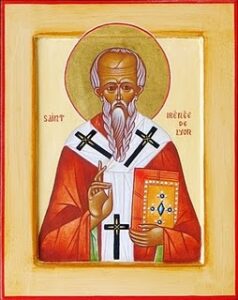Response to David Roxas (1 of 4)
Robert
Re your statement “The fact is, imposing sola scriptura on the early Church Fathers IS a highly disputed matter, and does not hold up under scrutiny. Where is the supporting evidence?” I have a question or two.
1. Absent a body of oral tradition and the corpus of the church Fathers, which both developed over centuries and which the Fathers themselves did not have (Irenaus was not reading the Cappadocian Fathers nor was he celebrating the liturgy of Chrysostom) what is the source of Christian knowledge of God, the law, and the Gospel of Jesus Christ? From whence did the later developed corpus of the Fathers and the oral tradition receive it’s knowledge of the Gospel?
2. Irenaus writes: “We have learned from none others the plan of our salvation, than from those through whom the Gospel has come down to us, which they did at one time proclaim in public, and at a later period, by the will of God, handed down to us in the Scriptures, to be the ground and pillar of our faith.” Adv. Her. 3.1.1
Are you contradicting the above statement of Irenaus which says the Scriptures are “the ground and pillar of our faith” or do you equate the later corpus of the Fathers and the body of oral (and mostly liturgical) tradition with Scripture? Are the writings of the Fathers and the liturgy of the church “theopneustos?” How does the Confession of Dosiethus agree with Irenaus when said confession is adamant that Christians should not read the Scriptures because they are obscure and require initiation into the secrets of theology?
3. Do you affirm or deny that the Scriptures are the revelation of God to man? If you affirm then what exactly is it you are rejecting when you reject and claim the Fathers rejected the principle of Sola Scriptura as being the source of our knowledge of God and the Gospel of Jesus Christ? Did the Fathers derive their knowledge of God and Christ from some other source than scripture and if so what was it?
David Roxas
[Note: This comment has been published as it was received. The only modifications are the emphasis in bold font.]
My Response (1 of 4)
Thank you for engaging Orthodoxy with an open mind and a sincere heart. What struck me as I read your comment was how your questions about sola scriptura and Tradition are so inescapably connected to epistemology. How we know what we know about God, Christ, Scripture, and the Church, touch on issues relating to the philosophy of knowledge. Rather than address your concerns in the comment section, I decided that many readers would benefit from a more extensive response in a separate article subdivided into several postings.
I will be addressing your questions in reverse order because the issue of the Holy Spirit’s inspiration of Scripture is foundational to our understanding of the Church Fathers and Apostolic Tradition. This past feast day of Pentecost offers us a salient context for your questions. This is because Christian epistemology cannot be separated from Christ’s promise that He would send the Holy Spirit to guide the Church into all Truth (John 14:26, 16:13). While Pentecost provides the context for reflecting on Orthodoxy’s understanding of Scripture and Apostolic Tradition, it also raises questions about Protestantism’s tenet of sola scriptura.
Does Orthodoxy Believe Scripture to Be Divinely Inspired?
You asked: 3. Do you affirm or deny that the Scriptures are the revelation of God to man?
Answer: Yes. The Orthodox Church affirms the Bible to be God’s revelation to man. Furthermore, the Orthodox Church affirms Scripture to be divinely inspired. I do not reject Scriptures as God’s revelation to man when I reject sola scriptura. That is not the central issue here. What is central here is that nowhere do the Holy Scriptures attest that they alone are God’s revelation to man. Christ assured the Apostles that they would be empowered by the Holy Spirit to be His witnesses (Acts 1:8) and that the Holy Spirit would lead them into all Truth (John 16:13). Nowhere do we read of Christ’s promising that the Holy Spirit would guide the Apostles in writing the divinely inspired New Testament which would be the exclusive source of doctrine and practice for the Church. Thus, Scripture never stood alone. It derives from a prior Holy Tradition which is inspired revelation of God. Scripture and Tradition always go together. This is not unique to the New Testament, but also true of the Old Testament. Moses, in writing the Pentateuch, drew on an ancient Tradition received from the Patriarchs and even Adam.
The Biblical Witness to Oral Tradition
You asked: 3. Did the Fathers derive their knowledge of God and Christ from some other source than scripture and if so what was it? (Emphasis added.)
Answer: Yes. That other source is oral Apostolic Tradition. The reason why I no longer hold to sola scriptura is that the Bible teaches the authority of oral Apostolic Tradition. In 1 Thessalonians 1:13, we read that Apostle Paul considered his oral teachings to be the “word of God,” not mere human tradition.
And we also thank God continually because, when you received the word of God, which you heard from us, you accepted it not as the word of men, but as it actually is, the word of God, which is at work in you who also believe. (1 Thessalonians 2:13; NIV; emphasis added)
The phrase “which you heard from us” indicates oral Tradition. I have used the capitalized form “Tradition” in light of Paul’s description of his oral teachings being “the word of God.” Twice! Here we have Scripture bearing witness to oral Tradition.
For Apostle Paul, oral Tradition was not an optional add-on, but essential to being a Christian. He exhorted the Christians in Thessalonica:
So then, brothers, stand firm and hold to the traditions we passed on to you, whether by word of mouth or by letter. (2 Thessalonians 2:15; NIV: emphasis added)
The phrase “word of mouth” indicates oral Tradition and “letter” refers to Scripture. By his use of the word “whether,” Paul assigns equal authority to oral and written Tradition. Here we see Paul making an explicit reference to Tradition. The original Greek “παραδόσεις” means “tradition.” The popular New International Version Bible attempts to avoid this embarrassing fact by rendering the word as “teachings” and relegating “traditions” to the footnote.
We learn from 1 and 2 Thessalonians two important facts: (1) what the Thessalonian Christians heard from Paul (oral Tradition) is just as much the word of God as what Paul wrote to them (written Tradition), and (2) both oral and written Tradition were to be held onto steadfastly by Christians. This obligation to adhere to Tradition applies to laity, e.g., the Thessalonian Christians. This obligation applies to church leaders as well. Paul admonished Bishop Timothy:
What you heard from me, keep as the pattern of sound teaching, with faith and love in Christ Jesus. Guard the good deposit that was entrusted to you—guard it with the help of the Holy Spirit who lives in us. (2 Timothy 1:13-14; NIV; emphasis added)
Here we see the origins of oral Tradition and its subsequent transmission via the ordained bishops. In 1 Timothy, we learn that what Timothy had heard from Paul – oral Tradition, he was to safeguard. In 2 Timothy 2:2, we learn that Paul intended for this oral Tradition to be passed on via the bishops to future generations. Where the priest’s responsibility pertains to the local congregation, the bishop’s scope of responsibility is broader, often encompassing a network of local churches. The job of the bishop was not to “theologize” (create new doctrine) but to safeguard the “good deposit” he had received from his predecessors. It should be noted that in 1 and 2 Timothy there is no suggestion Paul ordering Timothy to write down what he had heard from Paul.
And the things you have heard me say in the presence of many witnesses entrust to reliable men who will also be qualified to teach others. (2 Timothy 2:2; NIV; emphasis added)
We learn from 1 and 2 Timothy four critical exegetical facts: (1) that the “pattern of sound teaching” and the “good deposit” that Timothy had heard from Paul comprised oral Tradition; (2) this oral Tradition was not a secret teaching, but one that was heard by “many witnesses”; (3) Timothy was commanded by Paul – no mere suggestion – to pass on this oral Tradition to “reliable men” laying the foundation for apostolic succession via the office of the bishop; and (4) Timothy was to do all this with the help of the Holy Spirit. Thus, oral Tradition is not mere “tradition of man,” but rather apostolic instructions inspired by the Holy Spirit, which the Apostles committed to their disciples, the bishops. Orthodoxy has a succession of bishops whose lineage can be traced back to the Apostles; Protestantism cannot make this claim.
If we examine 1 and 2 Timothy carefully, we find not a single verse that teaches sola scriptura. The two verses, 2 Timothy 3:15-16, that many Protestants like to quote pertain not to the New Testament, but to the Old Testament. That is not the Bible as we know it today.
. . . and how from infancy you have known the holy Scriptures, which are able to make you wise for salvation through faith in Christ Jesus. All Scripture is God-breathed and is useful for teaching, rebuking, correcting, and training in righteousness . . . . (2 Timothy 3:15-16; NIV; emphasis added)
The fact that Timothy was half-Jewish helped prepare him to receive Jesus as the Messiah. He grew up exposed to the God-breathed Jewish Torah – mostly likely having heard it read out loud in the local synagogue. Protestants need to beware of assuming that Timothy as a little boy grew up reading the King James Bible. What many Protestants have done with respect to 2 Timothy 3:15-16 is eisegesis – reading Protestantism’s sola scriptura into Paul’s letters. If Protestants wish to prove sola scriptura from 2 Timothy 3:15-16, they must be able to exegete the following conclusions from the passage: (1) that Scripture stands apart from the Church, (2) that Scripture is the highest authority for Christian doctrine and practice, and (3) that Scripture is the standard for correcting the Church when it falls into error.
Another favorite bible passage of Evangelicals is the Great Commission. This passage also provides important support for the traditioning process.
Therefore go and make disciples of all nations, baptizing them in the name of the Father and of the Son and of the Holy Spirit, and teaching them to obey everything I have commanded you. (Matthew 28:19-20; NIV; emphasis added)
What is important to note about the Great Commission is that nowhere does Christ say anything about putting his teachings into written form. This omission makes sense in light of Jesus’ ministry as a first-century Jewish rabbi. When we look at church history we see that early on the Apostles relied on the oral proclamation of the Gospel and oral instruction on the Christian way of living. Then, in due course, the Apostles would instruct their followers through letters and other writings. Nowhere do we find the Apostles saying anything like: “This written letter has greater authority than the verbal instructions that I gave earlier.” Indeed, as seen above, we find just the opposite to be true.
Regrettably, the way in which Mr. Roxas set up his questions in effect divorces both Holy Scripture and Apostolic Tradition from Pentecost, that is, from the Holy Spirit’s pedagogical presence in the early Church. It is a fact that for the first several centuries, the Church functioned successfully and grew phenomenally without a formalized biblical canon. The Holy Spirit – over several decades – inspired the Apostles as they wrote what would be the New Testament, then the Holy Spirit – over the next several centuries – guided the disciples of the Apostles, i.e., the bishops, in discerning which of all the writings circulating were indeed inspired Scripture. Protestantism promotes a naive and implicitly ahistorical attitude toward what was a long process that spanned several centuries and deeply involved the Church Catholic.
One of the assumptions underlying sola scriptura seems to be that the Bible alone is divinely inspired and everything else is human, flawed, and to be viewed with distrust. This separation of Scripture from Tradition creates for Protestantism a black-and-white dichotomy in the way it does theology and views church history. Yet, the Apostles did not insist on separating Scripture from Holy Tradition, then denigrating Tradition to a subordinate position. Neither did the Apostles elevate Scripture over the Church. What we find in the New Testament and the writings of the Church Fathers is Scripture and Holy Tradition in complementary juxtaposition to each other.
Robert Arakaki









Recent Comments